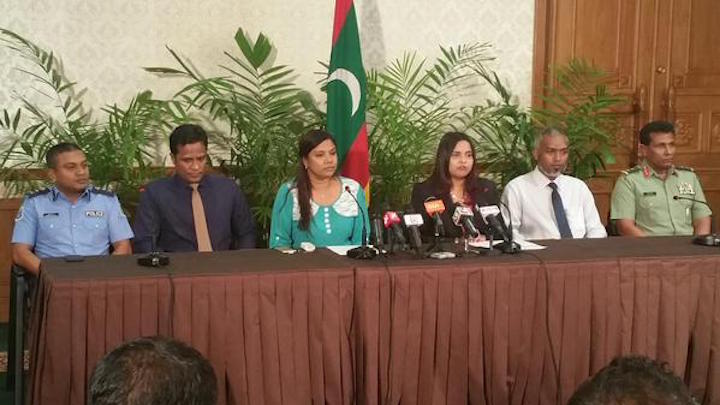Following an outbreak of dengue fever, the government has closed schools until further notice. At least two people have died from dengue this week.
Speaking at a press conference of a high-level task force formed to control the spread of the mosquito-borne disease, education minister Dr Aishath Shiham said schools are being shut down temporarily to ensure the safety of students.
Special classes will be organised for grade 10 students to prepare for their O’ Level exams in October.
A pregnant 18-year-old woman died of dengue fever at the Indira Gandhi Memorial Hospital on Friday night while a migrant worker died in Gaaf Alif Kooddoo last week.
A seven-month old infant who showed symptoms of dengue-fever died at Baa Atoll Eydhafushi today.
Meanwhile, some 1900 people sought treatment for a flu this week alone. The symptoms of the flu include diarrhea and vomiting.
A relatively severe outbreak of dengue in 2011 saw a record high 12 deaths.
Health minister Iruthisham Adam told the press today that the government’s efforts were geared towards preventing an outbreak of similar proportions.
Compared to the 2011 outbreak, the health minister said the spread of the disease this year has been “manageable” due to proactive preventive measures.
In addition to mosquito fogging in Malé and the atolls, Iruthisham said the government is launching a nationwide clean-up programme, and appealed for participation at the household and community levels.
Arrangements have been made to provide treatment for dengue fever at the government-run Dhamana Veshi urban primary health centre, the police ‘Noosandha’ clinic, and the Senahiya military clinic, she said.
The Health Protection Agency (HPA) has meanwhile launched a 24-hour ‘dengue hotline’ and urged the public to call or text 7548221 for information.
Housing minister Dr Mohamed Muiz said the ministry is scaling up its cleaning efforts to eliminate mosquito breeding sites from construction sites.
An additional tug boat will begin operations today to improve waste management services in the capital, he added.
Home minister Umar Naseer appealed for cooperation from councils, clubs and communities in islands with the government’s programmes.
Earlier this month, HPA issued an alert warning of the spread of dengue and viral fever across the country and advised precautionary measures to control mosquito breeding during the rainy season.
The agency advised the public to empty stagnant water from containers, throw trash into dustbins, and keep containers sealed to prevent water from accumulating.
The HPA also advised wearing clothes that hide the skin, using mosquito repellants, and keeping doors and windows closed during dawn and dusk.
The agency has stressed the importance of cleanliness and hygiene to prevent the spread of the disease and advised seeking medical assistance if a fever persists for more than three days.
Symptoms of dengue fever include fever, headache, muscle and joint pains, and a characteristic skin rash.
High level meeting on #Dengue in progress; to discuss national level response #HappeningNow pic.twitter.com/O7Sb3neUVw
— Min of Health_mv (@MoH_mv) June 28, 2015
#DengueOutbreak: Know the symptoms of #Dengue: fever, headache, pain behind eyes, muscle n joint aches, rash, nausea pic.twitter.com/zkGVdmV1kg — HPA Maldives (@HPA_MV) June 27, 2015
#DengueOutbreak: Remove water from potted plants to stop breeding, use repellents & aerosol spray to kill mosquitoes pic.twitter.com/89t4w8vDn9
— HPA Maldives (@HPA_MV) June 27, 2015
Care for a #dengue patient: Keep them hydrated, make them take ample rest, control the fever, apply insect repellent! pic.twitter.com/wL9blcMwOM — HPA Maldives (@HPA_MV) June 27, 2015
